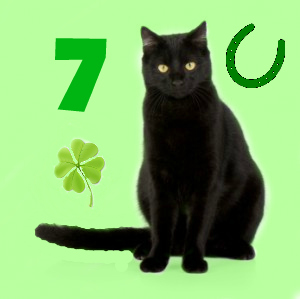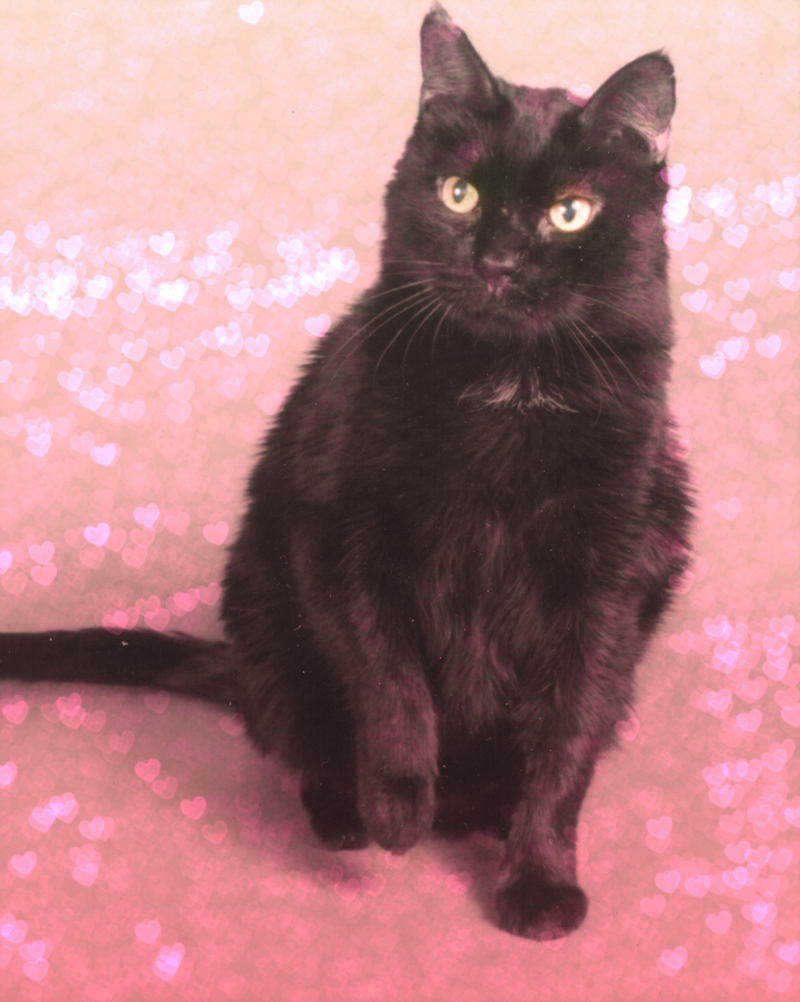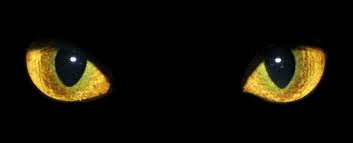 Does it suck to be you? Have you received a letter from the IRS? Do you need to ramp it up in the Good Fortune department? Throw away the rabbit’s foot. (After all, it didn’t help that bunny one bit, did it?) The remedy to your misfortune could be as close as your local animal shelter. Adopt a black cat.
Does it suck to be you? Have you received a letter from the IRS? Do you need to ramp it up in the Good Fortune department? Throw away the rabbit’s foot. (After all, it didn’t help that bunny one bit, did it?) The remedy to your misfortune could be as close as your local animal shelter. Adopt a black cat.
Many Americans grew up distrusting black kitties. But the U.S. is out of step with the rest of the world when it comes to their beliefs about them. As Paul Harvey used to say, “This is the rest of the story.”
Whether coal-coated felines are harbingers of good or evil depend on where they live. People the U.S., Spain and Belgium often associate black cats with the devil. American animal shelters struggle to find homes for friendly black strays because of their undeserved reputation for causing havoc. Fortunately, the rest of the world loves lap panthers. In Egypt, Great Britain, Australia and Japan, owning or encountering a black cat assures good fortune.
In 2000 B.C. when cats delivered Egypt from famine by controlling the local Mickey Mouse population, Pharaoh elevated them to deities. Enter Bastet, with the head of a black cat and the body of a woman. She became the goddess of motherhood, fertility, grace, beauty, and not surprisingly, cats. Egyptians courted Bastet’s favor by keeping black cats in their homes and leaving food out to attract them. They believed through their pets, Bastet would bless them with prosperity.
 While the Egyptians’ love of black cats is legendary, the Finnish, Celts, Romans, Norse and Latvians also held black cats in high esteem and believed they would be blessed by their presence.
While the Egyptians’ love of black cats is legendary, the Finnish, Celts, Romans, Norse and Latvians also held black cats in high esteem and believed they would be blessed by their presence.
The cat-loving British continue to value their black kitties above all others. An old English charm promises, “Black cat, cross my path–good fortune bring to home and hearth. When I am away from home, bring me luck wherever I roam.” Another British proverb claimed, “Whenever the cat of the house is black, the lasses of lovers will have no lack.” Black kittens on the porch promised the Scottish future riches and happiness. Celtic legend assured wealth and prosperity if a strange black cat shows up on your doorstep as long as you care for him. In most countries chasing a black cat away invites trouble. If the cat abandons a home or ship, disaster will soon follow.
An early 16th century British tradition encouraged visitors to kiss the family’s coal-colored feline. Brides in southern England whose path were crossed by a black cat would have a happy marriage.
England’s King Charles I was so afraid of losing his lucky black cat, he placed a 24-hour guard around him. Eventually the cat fell ill and died. Legend says distraught Charles cried out, “Alas, my luck is gone.” The next day Oliver Cromwell’s troops arrested him for treason. In 1649, Charles was beheaded.
 If they’d run television commercials in the 18th century, you might have heard: “Black Cats: Don’t leave home without one.” Yorkshire fisherman wouldn’t sail without their most vital crewmember: the ship’s black cat. He offered protection and good luck. Punishment for harming him could be death. After all, without the black cat the ship couldn’t make it home safely.
If they’d run television commercials in the 18th century, you might have heard: “Black Cats: Don’t leave home without one.” Yorkshire fisherman wouldn’t sail without their most vital crewmember: the ship’s black cat. He offered protection and good luck. Punishment for harming him could be death. After all, without the black cat the ship couldn’t make it home safely.
Even sailors’ wives kept a feline talisman to keep their seafaring husbands safe. The height of the fishing industry spawned a black-cat black-market in Yorkshire. Women had to keep constant watch on their raven-furred felines otherwise racketeers would snatch them and sell them to another fisherman’s wife.
Winston Churchill believed in the power of the black cat. His kitty, Nelson, reputedly had his own chair at the Cabinet, and attended all the meetings. During World War II Churchill made a point of stroking any black cat he found. He even credited his wartime success to this practice.
 Things fell apart during the Middle Ages. Before then, the Catholic Church had no policy on cats. Monasteries often had mousers for companionship. In the 6th Century, Pope Gregory the Great even had a pet cat he was very fond of. However, in 1232 when Pope Gregory IX needed a scapegoat to distract the masses from rampant disease, famine and war, he declared cats the embodiment of the devil. This decree sent domestic cats to the edge of extinction in Europe.
Things fell apart during the Middle Ages. Before then, the Catholic Church had no policy on cats. Monasteries often had mousers for companionship. In the 6th Century, Pope Gregory the Great even had a pet cat he was very fond of. However, in 1232 when Pope Gregory IX needed a scapegoat to distract the masses from rampant disease, famine and war, he declared cats the embodiment of the devil. This decree sent domestic cats to the edge of extinction in Europe.
Feline extermination resulted in an invasion of rats and their plague-carrying fleas. The rodents caused famine by gorging themselves on the grain stores and contaminating what they didn’t eat. Figures vary, but with no cats to control vermin, the Black Death claimed between a third and half the population of Europe from 1347 to 1351. The Plague persisted in varying degrees of severity until the 18th century, which also coincides with cats being welcomed again into villages and homes.
However, Pilgrims, filled with old-time fear of cats, brought their black cat prejudice to the New World. Distrust of them persisted throughout the New England witch trials and continues even today.
For prospective pet owners, black cats may be luckier than their fairer-haired counterparts. Besides providing the perfect camouflage for a nighttime predator, researchers at the National Institutes of Health discovered same the gene that gives cats the black coat also makes them more resistant to some disease.
So if you want make up for all those ladders you’ve walked under or the cracks you’ve stepped on, adopt a feline companion with a coal-black coat and a tough constitution. You may not find buried gold under your house, but with a gentle couch panther by your side you’ll always stay in the black.













Recent Comments